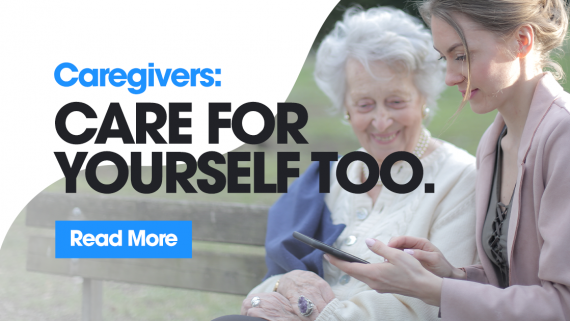Alzheimer’s is a progressive disease that impairs memory and many other essential mental functions. Although the changes are more subtle at first, eventually those diagnosed will need the help of a caregiver to perform their daily tasks. In many cases, the caregiver is a loved one or family member that volunteers to support them. Being a caregiver can be physically, emotionally, and mentally draining. Learning to care for yourself is the best way to ensure you will be there to care for your loved one.
From Care Partner to Caregiver and Burnout
In the early stages of Alzheimer’s, many function independently, and your role is more of a care partner who will help support and plan for the future of your loved one. As the disease progresses, their reliance on you will continue to increase until they need you 100%. Navigating the physical and emotional ups and downs of this journey can test even the most patient souls. It can be all-consuming, and just like any fire, it will eventually burn itself out.
Approximately 15 million Americans provide unpaid care to an older adult. Those that provide substantial care are more likely to have physical and emotional health issues. Caregiver burnout is real and can snowball over time. Recognizing the signs of burnout can help you get the help you need to continue providing the best care possible.
Signs of Caregiver Burnout:
- You have much less energy and always exhausted
- Increasingly impatient and irritable with who you are caring for
- Neglectful of your own needs
- You get sick more often
How to be a Healthy Caregiver

One of the most important things you can do as a caregiver is to take care of yourself. Keep your health a priority by seeing your doctor when needed, exercising regularly, and eating a healthy diet. The National Institute on Aging also recommends:
- Ask for help, and take it when you need it
- Take breaks during the day
- Join a support group online or in-person
- Spend time with friends
Research for a Better Future Free of Alzheimer’s
As an Alzheimer’s caregiver, you witness firsthand how this disease changes a person until very few pieces remain of their former selves. Alzheimer’s has no cure, and there is no way to stop the progression of it. Scientists and researchers are hard at work, identifying potential new ways to detect, prevent, manage, and eventually cure it. Clinical research studies and volunteers who participate in them provide a way to determine if they are safe and effective.

If you or a loved one has been diagnosed with Alzheimer’s, research studies may be an option. All Alzheimer’s participants must have a study partner that spends some time with them during the week, to accompany them to some of the study visits. This relationship provides researchers additional insight into the changes that have occurred over time with the patient. Participating in research may provide caregivers another layer of support and education about memory loss.
Caregivers do not need to attend each study visit, sometimes allowing the flexibility to do some shopping or enjoy some alone time. Regular assessments at study visits and conversations with study staff also help caregivers stay informed on their loved one’s health. Caregivers make many decisions with and for their loved ones, consider participating in a research study.
To learn more about the Alzheimer’s studies currently enrolling at our Methuen, MA location, call (978) 655-7155, or click here.
References:
https://www.alz.org/help-support/caregiving
https://www.nia.nih.gov/health/getting-help-alzheimers-caregiving
https://www.helpguide.org/articles/stress/caregiver-stress-and-burnout.htm

